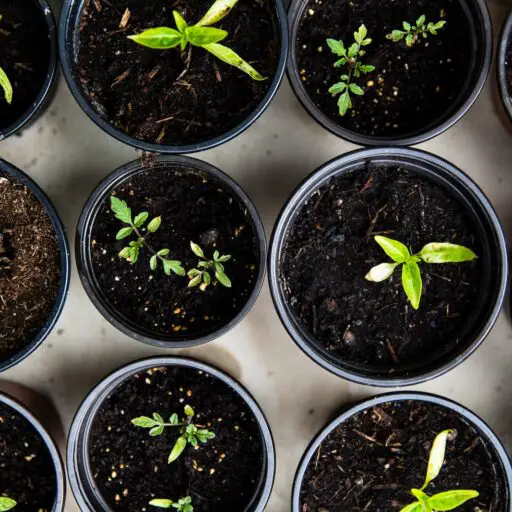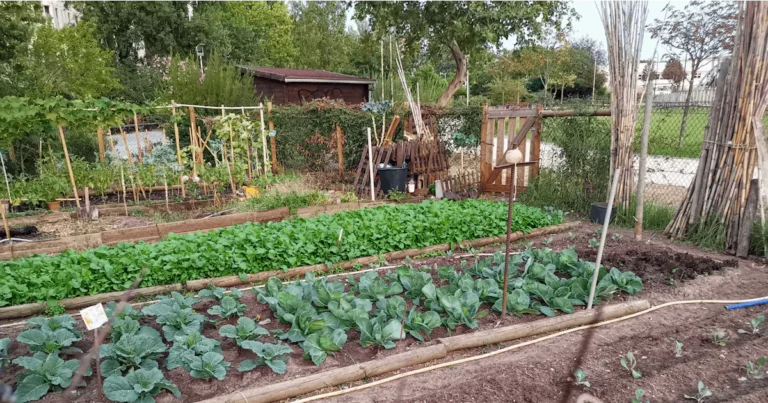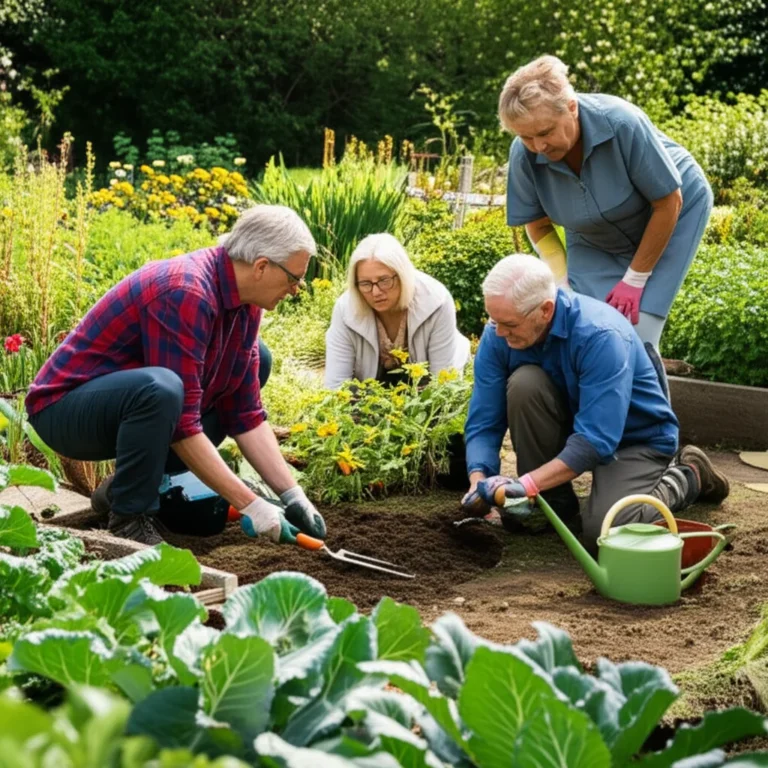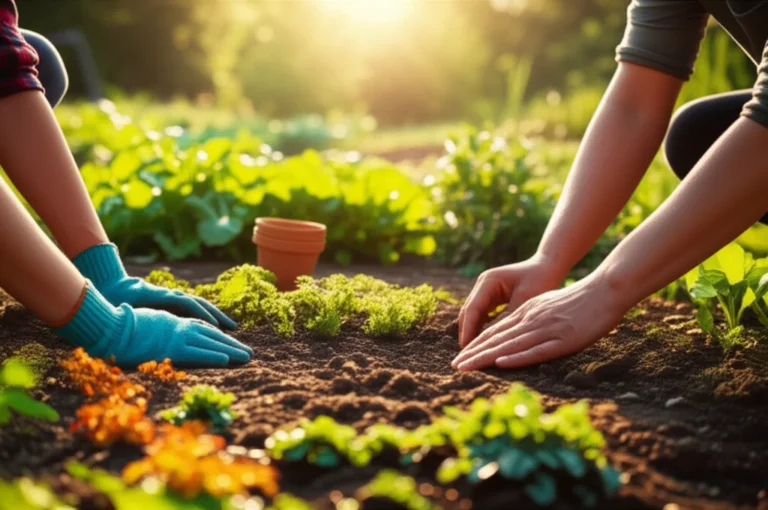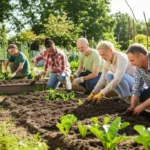Support our educational content for free when you purchase through links on our site. Learn more
Imagine stepping into a vibrant garden where the air is filled with the scent of fresh earth and blooming flowers — but it’s not just the plants that are thriving. Meet Sarah, who found her anxiety melting away as she dug her hands into the soil alongside neighbors she’d never met before. What if the secret to better mental health was growing right outside your door, rooted in community gardens?
In this article, we uncover 10 powerful ways community gardening transforms mental wellness, backed by science and real stories from gardeners at Community Gardening™. From reducing stress and combating depression to sharpening your brain and building lifelong friendships, community gardens are nature’s prescription for a happier, healthier mind. Ready to discover how you can cultivate wellness while growing your own patch of green? Let’s dig in!
Key Takeaways
- Community gardening significantly improves mental health by combining physical activity, social connection, and nature exposure.
- It reduces stress, anxiety, and symptoms of depression through mindful engagement and therapeutic benefits.
- Gardening fosters social bonds that combat loneliness and build resilience.
- Accessible garden design and ergonomic tools make gardening inclusive for all abilities.
- Seasonal gardening aligns with natural rhythms to provide year-round mood enhancement.
- Real gardeners’ stories highlight the transformative power of shared green spaces.
Ready to start your own garden? Check out top-rated ergonomic tools from Fiskars and Radius Garden to make your gardening experience comfortable and joyful:
Table of Contents
- Quick Tips and Facts: Boost Your Mood with Community Gardening 🌱
- Digging Deeper: The Roots of Community Gardening and Mental Wellness 🌿
- 1. How Community Gardening Enhances Mental Health: Science and Stories 🧠
- 2. Social Connections: Growing Friendships and Fighting Loneliness 🤝
- 3. Stress Reduction and Mindfulness in the Garden: Nature’s Therapy 🌼
- 4. Physical Activity and Its Positive Impact on Mental Wellness 💪
- 5. Community Gardening as a Tool for Combating Depression and Anxiety 🌞
- 6. Gardening for Cognitive Function: Boosting Brain Health and Memory 🧩
- 7. Inclusivity and Accessibility: Making Community Gardens Welcoming for All ♿️
- 8. Designing Your Community Garden for Maximum Mental Health Benefits 🎨
- 9. Success Stories: Real-Life Testimonials from Community Gardeners 🌟
- 10. Challenges and Solutions: Overcoming Barriers in Community Gardening 🚧
- The Science Behind It: Research Studies and Expert Opinions 🔬
- Practical Tips: Getting Started with Your Own Community Garden 🛠️
- Seasonal Gardening and Mental Health: How the Calendar Affects Your Mood 🌦️
- Gardening Tools and Resources That Enhance Wellness 🌻
- Conclusion: Why Community Gardening Is a Mental Health Game-Changer 🎯
- Recommended Links: Dive Deeper into Community Gardening and Wellness 📚
- FAQ: Your Burning Questions About Community Gardening and Mental Health Answered ❓
- Reference Links: Trusted Sources and Further Reading 🔗
Quick Tips and Facts: Boost Your Mood with Community Gardening 🌱
Welcome to the green side of mental health! At Community Gardening™, we’ve seen firsthand how digging in the dirt can dig out stress and plant seeds of happiness. Here are some quick, science-backed nuggets to get you started:
- ✅ Community gardening boosts subjective well-being more than solo gardening or non-gardening outdoor activities. (Source: PMC Study)
- ✅ It increases resilience, optimism, and self-esteem, key mental health boosters.
- ✅ Gardening lowers stress and anxiety by promoting mindfulness and relaxation.
- ✅ Social connections formed in community gardens combat loneliness and foster belonging.
- ✅ Physical activity in the garden improves mood and cognitive function.
- ✅ Access to green spaces correlates with reduced depression and anxiety rates.
- ✅ Gardening is a therapeutic tool recognized by health professionals, including horticultural therapy specialists.
Fun fact: Just one session of allotment gardening can elevate your mood and self-esteem! 🌞
Ready to dig deeper? Let’s explore how community gardening transforms mental health and wellness from the roots up.
Digging Deeper: The Roots of Community Gardening and Mental Wellness 🌿
Before we get our hands dirty, let’s understand the historical and social roots of community gardening and why it’s a powerhouse for mental wellness.
Community gardens are more than just shared plots; they’re living social hubs where people grow food, friendships, and resilience. Originating as urban solutions to food scarcity and social isolation, these gardens have blossomed into vital green spaces that promote health, empowerment, and community cohesion.
In places like Singapore, the Community in Bloom (CIB) initiative has fostered nearly 1,000 community gardens, integrating them into urban design to boost residents’ mental health (PMC Study). Meanwhile, in New Jersey, community gardens serve as therapeutic spaces addressing trauma and mental health disparities (Rutgers Extension).
At Community Gardening™, we see these gardens as nature’s mental health clinics—open to all, free of charge, and blooming with benefits.
1. How Community Gardening Enhances Mental Health: Science and Stories 🧠
The Science Behind the Soil
Studies show community gardeners report higher subjective well-being, resilience, and optimism than individual gardeners or non-gardeners. This isn’t just anecdotal; it’s backed by rigorous research using validated scales like the Brief Resilience Scale and Life Orientation Test-Revised (PMC Study).
Why? Because community gardening combines:
- Physical activity: Moderate exercise that releases endorphins.
- Connection to nature: Exposure to greenery reduces cortisol (stress hormone).
- Social interaction: Builds support networks and reduces loneliness.
- Meaningful achievement: Watching plants grow fosters pride and purpose.
Stories from the Garden
Take Maria, a retiree who joined her local community garden after losing her spouse. She says, “The garden gave me a reason to get up, meet people, and feel alive again.” Or Jamal, a teen who found peace and focus through gardening, helping him cope with anxiety.
At Community Gardening™, these stories are common. The garden is a sanctuary and a classroom, teaching patience, hope, and resilience.
2. Social Connections: Growing Friendships and Fighting Loneliness 🤝
Community gardening is a social antidote to isolation. Humans are wired for connection, and gardens provide fertile ground for friendships to sprout.
- Shared goals: Working together to nurture plants builds teamwork and trust.
- Regular interaction: Weekly garden meetups create routine social contact.
- Intergenerational bonding: Gardens unite kids, adults, and seniors.
- Cultural exchange: Diverse communities share gardening traditions and recipes.
Research confirms that gardeners experience improved mental health through enhanced social capital (Rutgers Extension). Plus, social support buffers stress and promotes resilience.
At Community Gardening™, we host events like potlucks and seed swaps to strengthen these bonds. Because a garden without community is just dirt.
3. Stress Reduction and Mindfulness in the Garden: Nature’s Therapy 🌼
Gardening is a natural stress-buster. The Attention Restoration Theory (ART) explains how natural environments restore mental focus and reduce fatigue (PMC Study).
How Gardening Calms the Mind
- Sensory engagement: Touching soil, smelling flowers, hearing birds—these activate relaxation responses.
- Mindful tasks: Pruning, planting, and watering encourage present-moment awareness.
- Visual greenery: Views of plants lower blood pressure and improve mood (PMC6334070).
- Physical rhythm: Repetitive movements in gardening soothe anxiety.
Our gardeners often describe the garden as a “living meditation.” One member shared, “When I’m digging, I forget my worries. It’s like the soil absorbs my stress.”
4. Physical Activity and Its Positive Impact on Mental Wellness 💪
Gardening is a fun, low-impact workout that benefits both body and mind.
| Activity Type | Mental Health Benefit | Physical Benefit |
|---|---|---|
| Digging & Weeding | Releases endorphins, reduces anxiety | Strengthens arms and back |
| Planting & Watering | Promotes mindfulness, reduces stress | Improves fine motor skills |
| Harvesting | Boosts mood through accomplishment | Encourages movement and stretching |
Studies show gardening can be more effective than walking or moderate alcohol intake in protecting against dementia (PMC6334070).
At Community Gardening™, we recommend pairing gardening with light stretching and hydration for a holistic wellness routine.
5. Community Gardening as a Tool for Combating Depression and Anxiety 🌞
If depression and anxiety had a nemesis, community gardening would be a top contender.
- Mood enhancement: Exposure to sunlight increases serotonin and vitamin D.
- Sense of purpose: Caring for plants fosters responsibility and achievement.
- Social support: Shared experiences reduce feelings of isolation.
- Therapeutic engagement: Horticultural therapy is an evidence-based treatment for mental health (Rutgers Extension).
One gardener told us, “After joining the community garden, my anxiety lessened. The garden became my safe space.”
Healthcare providers increasingly recommend gardening as a complementary approach to traditional therapies.
6. Gardening for Cognitive Function: Boosting Brain Health and Memory 🧩
Gardening isn’t just good for your heart; it’s a workout for your brain.
- Memory and focus: Planning garden layouts and tracking plant growth stimulate executive function.
- Problem-solving: Managing pests and weather challenges enhances creativity.
- Cognitive resilience: Regular gardening is linked to lower dementia risk (PMC6334070).
Our senior gardeners report feeling sharper and more engaged since joining the garden. One shared, “I remember plant names better now, and I’m always learning something new.”
7. Inclusivity and Accessibility: Making Community Gardens Welcoming for All ♿️
Community gardens should be for everyone. That means designing spaces that are accessible and inclusive.
- Raised beds for wheelchair users
- Wide, smooth paths for mobility aids
- Sensory gardens for those with cognitive or sensory impairments
- Multilingual signage and culturally diverse plantings
At Community Gardening™, we advocate for universal design principles and partner with local organizations to ensure gardens are welcoming to all abilities and backgrounds. Because mental wellness blooms best in inclusive soil.
8. Designing Your Community Garden for Maximum Mental Health Benefits 🎨
Want to maximize the mental health perks of your garden? Here’s how to design it right:
| Design Element | Mental Health Benefit | Tips & Examples |
|---|---|---|
| Quiet zones | Space for meditation and relaxation | Benches under shade, labyrinth paths |
| Sensory plants | Engage senses, promote mindfulness | Lavender, mint, sunflowers |
| Social spaces | Encourage interaction and community building | Picnic tables, pergolas |
| Accessible pathways | Ensure inclusivity and ease of movement | Smooth, wide paths with gentle slopes |
| Colorful plantings | Boost mood and visual interest | Mix bright flowers and greenery |
| Water features | Calming sounds reduce stress | Small fountains or birdbaths |
Check out our Garden Design Ideas for inspiration and detailed plans.
9. Success Stories: Real-Life Testimonials from Community Gardeners 🌟
Nothing beats hearing from those who’ve felt the magic firsthand.
- Linda, 62: “After joining the community garden, my depression lifted. The friendships and fresh air were lifesavers.”
- Carlos, 29: “Gardening helped me manage my anxiety. It’s my therapy without the couch.”
- Aisha, 15: “I learned patience and focus. The garden is my happy place.”
These stories echo research findings and remind us that community gardening is a living prescription for mental wellness.
10. Challenges and Solutions: Overcoming Barriers in Community Gardening 🚧
Of course, community gardening isn’t all sunshine and roses. Here are common hurdles and how to tackle them:
| Challenge | Solution | Community Gardening™ Tips |
|---|---|---|
| Limited space | Use vertical gardens, container planting | Start small; use balconies or rooftops |
| Lack of funding | Apply for grants, host fundraisers | Partner with local businesses and nonprofits |
| Accessibility issues | Implement universal design | Consult with disability advocates |
| Vandalism or theft | Secure fencing, community watch programs | Foster strong community ownership |
| Seasonal weather | Use greenhouses or cold frames | Plan year-round crops and activities |
| Volunteer burnout | Rotate tasks, celebrate achievements | Organize social events and recognition |
At Community Gardening™, we believe every challenge is an opportunity to grow stronger together.
The Science Behind It: Research Studies and Expert Opinions 🔬
Let’s geek out for a moment. The mental health benefits of community gardening are backed by a robust body of research:
- The Singapore study (PMC7558991) found community gardeners had significantly higher well-being, resilience, and optimism than non-gardeners.
- Rutgers Extension (njaes.rutgers.edu) highlights gardening as a therapeutic intervention for trauma and mental health challenges.
- A UK study (PMC6334070) shows that exposure to green spaces reduces stress, improves mood, and may even lower dementia risk.
Experts recommend incorporating gardening into mental health programs, social prescribing, and urban planning to harness these benefits.
Practical Tips: Getting Started with Your Own Community Garden 🛠️
Ready to jump in? Here’s how to start your own community garden that nurtures mental wellness:
- Find your tribe: Connect with neighbors, local nonprofits, or city programs.
- Choose your spot: Look for accessible, sunny locations with water access.
- Plan your garden: Decide on beds, paths, seating, and plant types.
- Secure resources: Apply for grants, seek donations, or partner with brands like Fiskars for tools (Fiskars on Amazon).
- Set guidelines: Create community garden policies to ensure respect and sustainability (Community Garden Policies).
- Organize events: Host planting days, workshops, and social gatherings (Community Garden Events).
- Maintain and celebrate: Rotate tasks, track progress, and celebrate harvests.
Starting a garden is a journey—one that grows your community and your soul.
Seasonal Gardening and Mental Health: How the Calendar Affects Your Mood 🌦️
Did you know your garden’s mood changes with the seasons—and so does yours?
- Spring: Renewal and hope as seeds sprout. Great for combating seasonal blues.
- Summer: Abundance and energy; perfect for social gardening and outdoor events.
- Fall: Reflection and gratitude during harvest; a calming time.
- Winter: Rest and planning; indoor gardening or seed starting can keep spirits up.
Seasonal gardening aligns with natural rhythms, helping regulate mood and providing year-round mental health benefits.
Gardening Tools and Resources That Enhance Wellness 🌻
The right tools make gardening joyful and accessible. Here’s our rating of some top brands for community gardeners:
| Brand | Design (1-10) | Functionality (1-10) | Accessibility (1-10) | Durability (1-10) | Overall (1-10) |
|---|---|---|---|---|---|
| Fiskars | 9 | 9 | 8 | 9 | 8.8 |
| Corona | 8 | 8 | 7 | 8 | 7.8 |
| Gardener’s Supply Co. | 8 | 9 | 9 | 8 | 8.5 |
| Radius Garden | 7 | 8 | 10 | 7 | 8.0 |
Why Fiskars? Their ergonomic designs reduce hand strain, perfect for gardeners with arthritis or limited strength. Plus, their tools are widely available on Amazon and Walmart.
Pro tip: Invest in gloves, kneeling pads, and sun protection to keep gardening comfortable.
👉 CHECK PRICE on:
- Fiskars Garden Tools: Amazon | Walmart | Fiskars Official Website
- Radius Garden Tools: Amazon | Walmart | Radius Garden Official
Conclusion: Why Community Gardening Is a Mental Health Game-Changer 🎯
So, what’s the final verdict from the Community Gardening™ team? Community gardening isn’t just a hobby — it’s a proven, multi-faceted mental health booster that combines physical activity, social connection, and nature therapy into one vibrant package. The science is clear: community gardeners consistently report higher well-being, resilience, and optimism than their solo or non-gardening counterparts. Plus, the garden’s social fabric weaves a safety net against loneliness and stress.
We’ve seen how gardening nurtures the mind just as much as the soil — reducing anxiety, lifting depression symptoms, sharpening cognition, and fostering emotional resilience. Whether you’re a seasoned green thumb or a curious newbie, community gardening offers a therapeutic escape and a joyful sense of belonging.
If you’re wondering how to get started or how to design your garden for maximum mental health benefits, remember: it’s all about connection — to nature, to others, and to yourself. And with the right tools, accessible design, and a welcoming community, anyone can reap these rewards.
No more waiting for the “right time” — the garden is calling, and your mental wellness will thank you for answering. 🌿🌞
Recommended Links: Dive Deeper into Community Gardening and Wellness 📚
Ready to gear up and grow your mental health? Check out these trusted products and books that can help you cultivate wellness:
-
Fiskars Garden Tools:
Amazon | Walmart | Fiskars Official Website -
Radius Garden Tools:
Amazon | Walmart | Radius Garden Official -
Gardener’s Supply Co. Tools:
Amazon | Gardener’s Supply Co. Official -
Books on Gardening and Mental Health:
Dive into these resources to deepen your understanding and enhance your gardening journey!
FAQ: Your Burning Questions About Community Gardening and Mental Health Answered ❓
How does community gardening reduce stress and anxiety in individuals?
Community gardening reduces stress and anxiety through a combination of physical activity, exposure to nature, and social interaction. The Attention Restoration Theory explains that natural environments help restore cognitive function and reduce mental fatigue. Physically, gardening tasks release endorphins, the body’s natural mood elevators. Socially, the garden provides a supportive community, reducing feelings of isolation. Studies have shown that even brief gardening sessions can lower cortisol levels and improve mood (PMC Study).
Can participating in community gardening initiatives improve symptoms of depression and mental wellbeing?
Absolutely. Community gardening offers meaningful engagement, routine, and accomplishment, which are crucial for combating depression. The combination of sunlight exposure (boosting vitamin D), physical activity, and social support creates a holistic therapeutic environment. Horticultural therapy, a professional treatment modality, uses gardening to improve mental health outcomes, especially for those with depression or trauma (Rutgers Extension). Many gardeners report improved mood and reduced depressive symptoms after sustained participation.
What role does social connection play in the positive impact of community gardening on mental health outcomes?
Social connection is a cornerstone of community gardening’s mental health benefits. The garden fosters regular interaction, shared goals, and a sense of belonging, which buffer against loneliness and stress. Social support networks formed in gardens increase resilience and optimism, helping individuals cope better with life’s challenges. Research highlights that community gardeners experience higher social capital and community cohesion, which directly correlate with improved mental health (PMC Study).
Do community gardens provide a therapeutic environment for people to cope with trauma and promote overall wellness?
Yes, community gardens serve as therapeutic landscapes that promote healing from trauma and support overall wellness. They offer safe, nurturing spaces where individuals can engage in purposeful activity, connect with nature, and build supportive relationships. Horticultural therapy programs often utilize community gardens to help individuals with physical, psychiatric, or developmental challenges. The calming sensory experiences and structured activities facilitate emotional regulation and resilience (Rutgers Extension).
How can community gardens be made more accessible to people with disabilities or mobility challenges?
Inclusive design is key. Community gardens can incorporate raised beds, wide and smooth pathways, ergonomic tools, and sensory plantings to accommodate diverse needs. Partnering with disability advocates and following universal design principles ensures that everyone can participate and benefit. Tools like Fiskars’ ergonomic garden tools and Radius Garden’s accessible designs help gardeners with limited strength or dexterity (Fiskars Official).
What are some practical ways to integrate community gardening into mental health programs or urban planning?
Healthcare providers and urban planners can incorporate community gardens as part of social prescribing, rehabilitation, and wellness initiatives. Designing gardens with therapeutic features, hosting horticultural therapy sessions, and promoting community engagement amplify mental health benefits. Cities like Singapore have successfully integrated community gardens into urban design to enhance residents’ well-being (PMC Study).
Reference Links: Trusted Sources and Further Reading 🔗
- Gardening for health: a regular dose of gardening – PMC
- Community gardening and mental health benefits – PMC Singapore Study
- Rutgers Cooperative Extension: Community Gardening and Mental Health – Rutgers Extension
- American Horticultural Therapy Association – AHTA Membership Directory
- Fiskars Gardening Tools Official Site – Fiskars
- Radius Garden Official Website – Radius Garden
- Gardener’s Supply Company – Gardeners.com
For more on the power of gardening to boost mental health and wellness, these sources provide a solid foundation of evidence and inspiration.
Happy gardening and mental flourishing! 🌿💚
